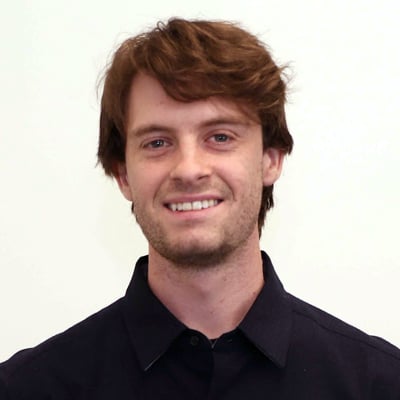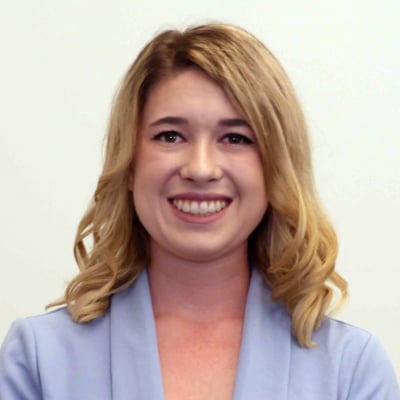LOS ANGELES – The ninth Summit of the Americas kicked off Tuesday night with an event focused on “Disrupting the Information Crisis and Building Media Sustainability,” but much of the discussion was on the safety of journalists in the Western Hemisphere and the growing mistrust of the news media.
Secretary of State Antony Blinken was a keynote speaker at the event, which was sponsored by Arizona State University’s Walter Cronkite School of Journalism and Mass Communication and the Equis Institute, in partnership with the Department of State. It was attended by dozens of journalists and leaders from across the Western Hemisphere.
“To the journalists and civil society leaders from across the hemisphere who made the journey to Los Angeles: welcome,” Blinken said. “We’re so grateful to have you here – and especially grateful for the crucial work that you do every single day.”
Blinken, who reported for his school newspaper, the Harvard Crimson, also referred to the journalists in training in attendance.
“To any of the J-school students in the audience, we are heartened by the path that you’re taking,” he said. “Now, I say that with some degree of modest authority, as a one-time aspiring journalist myself.”
Blinken’s panel discussion – “A Commitment to Journalistic Freedom” – was moderated by three young journalists with Cronkite School connections. Marcella Baietto, who graduated in 2020, now is a news anchor for Fox Illinois in Springfield. Madison Thomas and Andrea Villalobos are Cronkite News reporters, working in the Los Angeles and Phoenix bureaus, respectively.
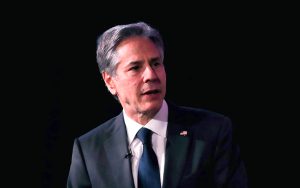
Secretary of State Antony Blinken was a keynote speaker at the Media Summit, which was sponsored by ASU’s Walter Cronkite School of Journalism and Mass Communication and the Equis Institute, in partnership with the Department of State, in Los Angeles. (Photo by Reece Andrews/Cronkite News)
“Take it from someone who never fully realized that aspiration – it is a challenging path,” Blinken said. “I suspect you know that already. But I couldn’t be more inspired to see rising journalists here, and I’m really looking forward to reading your bylines and hearing you and seeing you in the media over the years ahead.”
Blinken spoke about challenges facing journalists today, particularly in the Western Hemisphere. He brought up concerns about disinformation and journalist harassment, as well as efforts to combat those issues.
“Today, the United States is launching the first hub of the Digital Communication Network of the Americas,” he announced.
The nonprofit network works to strengthen journalism within the hemisphere. It runs exchange programs for journalists and others working in communications so they can employ those skills in their home countries. It has operated mostly in Eastern Europe and Central Asia, and now is expanding into the Americas.
“Since creating the DCN in 2015,” Blinken said, “we’ve actually helped build a network of more than 8,000 journalists, educators, communicators and new media professionals, public officials and others around the world who are working to combat state-sponsored disinformation and propaganda. The network does this by developing and sharing evidence-based tools to help local actors provide people with accurate information.”
Blinken said the Digital Communication Network battled disinformation about the ongoing COVID-19 pandemic, both online and from influential political figures.
“We’ve seen governments and other actors intentionally spread false narratives about COVID-19’s origin, its transmission and treatments in an effort to stoke fear, to sow doubt, including about safe and effective vaccines, to erode trust in democracy itself – including deliberately targeting Spanish-language social media in this region,” he said.
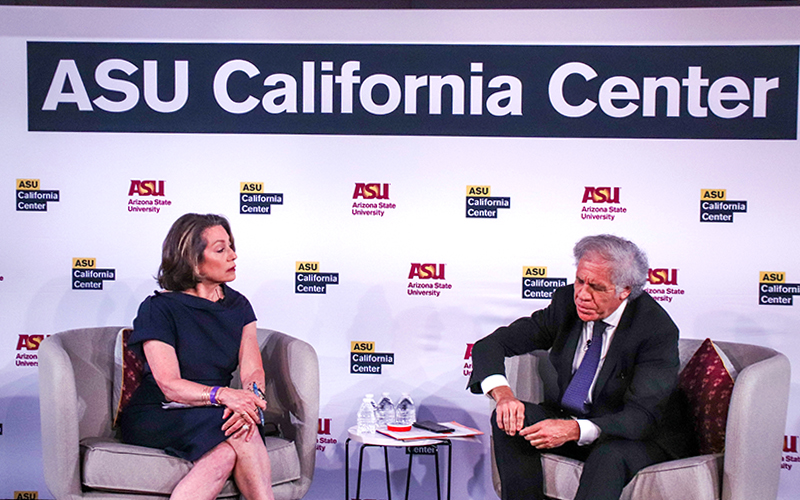
ASU vice dean and professor of practice Susan Goldberg talks with Luis Almagro, secretary general of the Organization of American States, at the Media Summit of the Americas. (Photo by Reece Andrews/Cronkite News)
“The reach of disinformation online is, quite simply, staggering. … In response, DCN has connected investigative journalists, data scientists, public health officials to share effective strategies on disseminating accurate information about COVID-19 and debunking harmful myths on social media.”
A major focus of the discussion was journalist safety.
“At least 17 journalists have been killed in this hemisphere in this year, according to the UNESCO Observatory of Killed Journalists,” Blinken said. “No region in the world is more dangerous for journalists.”
The UNESCO observatory said all 17 deaths took place in Latin America and the Caribbean and that the most recent death of a journalist in the United States was in 2018.
“Journalists in countries, including democracies, put their safety and lives on the line in order to do their job,” Thomas said. “And to the other journalists up here, is that something that kind of worries you guys entering this workforce?”
Blinken said several efforts are underway to protect journalists, “especially in independent media, where the resources may not be the same as for major media organizations. And it goes from everything to having the right tools to deal with their cyber security, to deal with their physical security, and also to deal with their legal and economic security.”
Blinken asked the moderators for their thoughts.
“Is this something, as you’re thinking about and are engaged in careers, is this something that you’re actually thinking about that’s a concern?” he asked.
“Definitely,” Baietto replied.
Villalobos mentioned a conversation with a fellow Cronkite School student about journalism safety.
“She was trying to see if there are some courses that we could put into place about teaching safety to journalists, how to defend yourself when you’re out there, or even just teaching things that might not be common sense to everyone about keeping yourself safe,” Villalobos said. “And just hearing that in your remarks, seeing that we may be doing things like that on a national level … I think that that’s a great idea.”
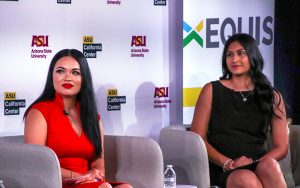
Madison Thomas, left, and Andrea Villalobos are Cronkite News reporters who led a conversation with U.S. Secretary of State Antony Blinken at the Media Summit of the Americas. (Photo by Reece Andrews/Cronkite News)
Blinken called the observation “extraordinary.”
“It’s a sad commentary, but it’s also, I think, a commentary on the fact that at least in different ways we’re trying to step up to this problem.”
The conversation then shifted toward trust in the news media, and the seemingly rapid decline in general trust in institutions in the past few years.
“I started journalism school 2016, when I think that’s the year we saw a huge shift in trusting the media,” Baietto said. “And so this is all I’ve ever known. I’ve only known that people don’t like us and that they don’t trust us, right?”
Baietto said she isn’t certain that trust can return.
“Just to be frank, I think we talk about the future of journalism and there’s a lot of responsibility put on the new generation, as we should, right, because we’re the ones on the front lines – the next ones,” she said. “But if you guys don’t have the answers, we definitely don’t either, right? But I think together we can find them. … But it’s going to be a give and take. It’s going to take some time.”
“That’s a wonderful way to look at it,” Blinken said. “I think it’s a wonderful motivation.”
Although he acknowledged the need for partnership among all generations to combat distrust in journalism and the news media, Blinken said the younger generation must take more of a leading role.
“Here’s the hard truth: We’re looking to you,” he said. “You’re the ones who need to figure this out. We’ll try our best.”
The Summit of the Americas continues through Friday at ASU’s California Center in the former Herald Examiner building in downtown Los Angeles.
